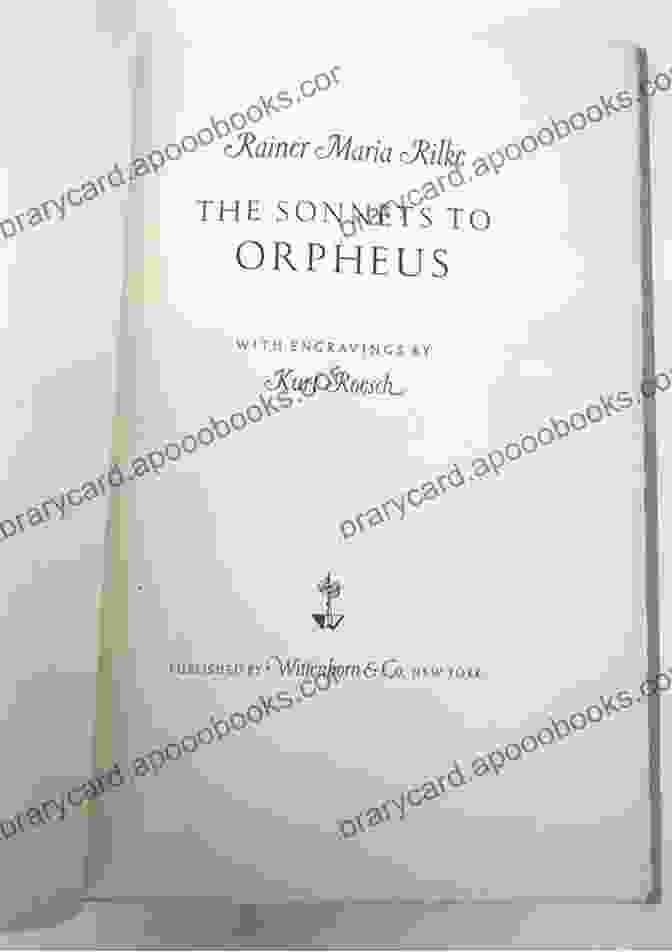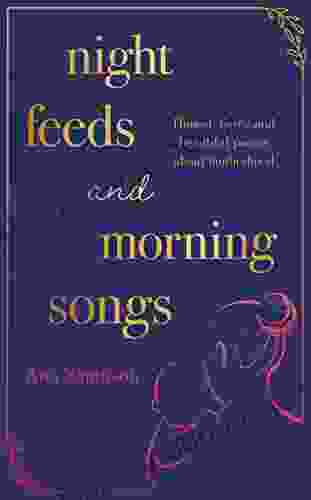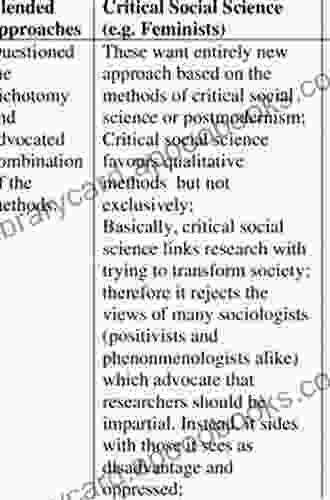Rilke's Sonnets to Orpheus: An Epic Journey Through Grief, Love, and the Search for Meaning


Rainer Maria Rilke's Sonnets to Orpheus, a collection of 55 sonnets written in 1922, is a poetic masterpiece that explores the themes of grief, love, and the search for meaning in life. Through the voice of Orpheus, the mythical musician who descended into the underworld to retrieve his beloved Eurydice, Rilke delves into the depths of human experience, offering insights into the nature of loss, creativity, and the transformative power of art.
4.7 out of 5
| Language | : | English |
| File size | : | 860 KB |
| Text-to-Speech | : | Enabled |
| Screen Reader | : | Supported |
| Enhanced typesetting | : | Enabled |
| Print length | : | 302 pages |
| Lending | : | Enabled |
Themes of Grief and Loss
The sonnets are deeply imbued with the theme of grief, as Rilke had recently lost his beloved friend and mentor, Lou Andreas-Salomé. Through Orpheus's journey, Rilke explores the overwhelming pain of loss and the struggle to find meaning in the face of adversity. In Sonnet I, he writes:
"O Bäume Lebens, o wann winterlich?" (O trees of life, when will you be winterly?)
The opening line, with its mournful repetition of "O," sets the tone for the collection. The trees of life represent the promise of renewal, but for the grieving poet, they have become symbols of the cold, barren winter of despair.
The Transformative Power of Love
Despite the omnipresence of grief, the sonnets also offer hope through the transformative power of love. Orpheus's love for Eurydice drives his quest to retrieve her from the underworld, even though he knows that she is lost to him forever. In Sonnet XIX, Rilke writes:
"Denn alles ist verwandelt, alles Ist neu gestiftet, reiner, feierlich." (For everything is changed, everything Is founded anew, purer, solemn.)
Orpheus's love transforms his experience of the underworld, revealing the hidden beauty and meaning within the darkness.
The Search for Meaning in Art
Beyond its exploration of grief and love, Sonnets to Orpheus is also a meditation on the nature of art and the artist's role. Rilke believed that art had the power to transcend the limitations of the physical world and bring us closer to the divine. In Sonnet XXII, he writes:
"Denn dort, wo Kunst geschieht, geschieht Nothwendiges. Es ringt Sich langsam aus dem Geist, das Unbewusste Und ist dann ein Geformtes, ein Ding." (For there, where art happens, necessary Things happen. Slowly it wrestles Its way out of the spirit, the unconscious And is then a formed thing, an object.)
For Rilke, art is not merely a product of inspiration but a necessary act that brings form to the unconscious and makes it accessible to the world.
Orpheus as a Symbol of the Poet
Throughout the sonnets, Orpheus serves as a symbol of the poet himself. Like Orpheus, the poet is a mediator between the world of the living and the world of the dead, able to give voice to the unspoken and the unseen. In Sonnet XXIV, Rilke writes:
"O Dichter, singe mir den einen Baum. Den einen Baum, den Baum, den ich nicht kenne, Den einen Baum, zu dem mich keiner führt." (O poet, sing me the single tree. The single tree, the tree that I don't know, The single tree, to which no one leads me.)
The poet, like Orpheus, is on a perpetual quest to find the inexpressible, to give voice to the unnamable.
Legacy and Impact
Sonnets to Orpheus has had a profound impact on generations of poets and readers. Its lyrical beauty and philosophical depth have made it a timeless classic, inspiring countless works of art and literature. The sonnets continue to offer solace and insight to those who grapple with loss, love, and the search for meaning in life.
Whether you are a seasoned poetry lover or a newcomer to the world of verse, Sonnets to Orpheus is a must-read. Its evocative language, timeless themes, and profound insights will leave an unforgettable mark on your soul.
Free Download Your Copy Today
Click the link below to Free Download your copy of Sonnets to Orpheus today and embark on an epic journey through grief, love, and the search for meaning.
Free Download Now
4.7 out of 5
| Language | : | English |
| File size | : | 860 KB |
| Text-to-Speech | : | Enabled |
| Screen Reader | : | Supported |
| Enhanced typesetting | : | Enabled |
| Print length | : | 302 pages |
| Lending | : | Enabled |
Do you want to contribute by writing guest posts on this blog?
Please contact us and send us a resume of previous articles that you have written.
 Book
Book Novel
Novel Page
Page Chapter
Chapter Text
Text Story
Story Genre
Genre Reader
Reader Library
Library Paperback
Paperback E-book
E-book Magazine
Magazine Newspaper
Newspaper Paragraph
Paragraph Sentence
Sentence Bookmark
Bookmark Shelf
Shelf Glossary
Glossary Bibliography
Bibliography Foreword
Foreword Preface
Preface Synopsis
Synopsis Annotation
Annotation Footnote
Footnote Manuscript
Manuscript Scroll
Scroll Codex
Codex Tome
Tome Bestseller
Bestseller Classics
Classics Library card
Library card Narrative
Narrative Biography
Biography Autobiography
Autobiography Memoir
Memoir Reference
Reference Encyclopedia
Encyclopedia John Legg
John Legg Michelle Hawkins
Michelle Hawkins Amy B Zegart
Amy B Zegart Tony Fadell
Tony Fadell L Dean Webb
L Dean Webb Owen Laukkanen
Owen Laukkanen Bonafide Rojas
Bonafide Rojas Ian Richardson
Ian Richardson Alyssa Gallagher
Alyssa Gallagher Andrea Dyrness
Andrea Dyrness Harold M North
Harold M North Amy Tyson
Amy Tyson Andy Mckee
Andy Mckee Caryn Lix
Caryn Lix Colin Leys
Colin Leys Chris Sharpe
Chris Sharpe Chandran Kukathas
Chandran Kukathas Patricia Harman
Patricia Harman Ambrose Bierce
Ambrose Bierce Amanda Roberts
Amanda Roberts
Light bulbAdvertise smarter! Our strategic ad space ensures maximum exposure. Reserve your spot today!

 Kazuo IshiguroThe 100 Greatest Rock Bassists: An Ode to the Unsung Heroes of Rock and Roll
Kazuo IshiguroThe 100 Greatest Rock Bassists: An Ode to the Unsung Heroes of Rock and Roll
 Roberto BolañoNight Feeds and Morning Songs: A Poetic Exploration of the Extraordinary...
Roberto BolañoNight Feeds and Morning Songs: A Poetic Exploration of the Extraordinary...
 Jamie BellEscape into the Enchanting World of Anjali: A Love Story that Will Captivate...
Jamie BellEscape into the Enchanting World of Anjali: A Love Story that Will Captivate... Easton PowellFollow ·2.2k
Easton PowellFollow ·2.2k Ralph Waldo EmersonFollow ·2.5k
Ralph Waldo EmersonFollow ·2.5k Ismael HayesFollow ·18k
Ismael HayesFollow ·18k Miguel de CervantesFollow ·4.5k
Miguel de CervantesFollow ·4.5k Noah BlairFollow ·13.3k
Noah BlairFollow ·13.3k Ernest J. GainesFollow ·5.3k
Ernest J. GainesFollow ·5.3k Frank ButlerFollow ·8.2k
Frank ButlerFollow ·8.2k Finn CoxFollow ·9.7k
Finn CoxFollow ·9.7k

 Roald Dahl
Roald DahlImmerse Yourself in a Mesmerizing Tapestry of Creativity:...
Prepare to be captivated by "Spectra," an...

 Clarence Brooks
Clarence BrooksUnleash Your Inner Taylor with Red Piano Vocal Guitar:...
Embrace the Red Era...

 Jeffrey Hayes
Jeffrey HayesUnlock Your Child's Academic Potential: A Comprehensive...
In today's rapidly changing...

 William Golding
William GoldingBrave Elizabeth: A Captivating Tale of Resilience and...
Immerse Yourself in a Riveting Historical...

 Curtis Stewart
Curtis StewartUnveiling the Heartfelt Melodies of Taylor Swift: A...
Step into the enchanting world of Taylor...
4.7 out of 5
| Language | : | English |
| File size | : | 860 KB |
| Text-to-Speech | : | Enabled |
| Screen Reader | : | Supported |
| Enhanced typesetting | : | Enabled |
| Print length | : | 302 pages |
| Lending | : | Enabled |








